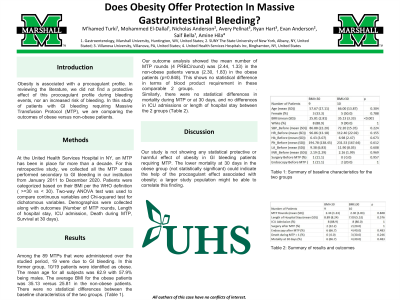Tuesday Poster Session
Category: GI Bleeding
P3454 - Does Obesity Offer Protection in Massive Gastrointestinal Bleeding?
Tuesday, October 24, 2023
10:30 AM - 4:00 PM PT
Location: Exhibit Hall


M'hamed Turki, MD
Marshall University
Huntington, WV
Presenting Author(s)
M'hamed Turki, MD1, Mohammed El-Dallal, MD2, Nicholas S. Anderson, BS3, Avery Pellnat, 4, Ryan Hart, 4, Evan Anderson, 5, Saif Bella, MD1, Amine Hila, MD6
1Marshall University, Huntington, WV; 2Marshall University Joan C. Edwards School of Medicine, Huntington, WV; 3Villanova University, Binghamton, NY; 4SUNY Upstate Medical University Hospital, Syracuse, NY; 5Villanova University, Villlanova, NY; 6United Health Services, Johnson City, NY
Introduction: Obesity is associated with a procoagulant profile. In reviewing the literature, we did not find a protective effect of this procoagulant profile during bleeding events, nor an increased risk of bleeding. In this study of patients with GI bleeding requiring Massive Transfusion Protocol (MTP), we are comparing the outcomes of obese versus non-obese patients.
Methods: At the United Health Services Hospital in NY, an MTP has been in place for more than a decade. For this retrospective study, we collected all the MTP cases performed secondary to GI bleeding in our institution from January 2011 to December 2020. Patients were categorized based on their BMI per the WHO definition ( >=30vs < 30). Two-way ANOVA test was used to compare continuous variables and Chi-squared test for dichotomous variables. Demographics were collected along with outcomes (Number of MTP rounds, Length of hospital stay, ICU admission, Death during MTP, Survival at 30 days).
Results: Among the 89 MTPs that were administered over the studied period, 19 were due to GI bleeding. In this former group, 10/19 patients were identified as obese.
The mean age for all subjects was 62.9 with 57.9% being males. The average BMI for the obese patients was35.13 versus 25.81 in the non-obese patients. There were no statistical differences between the baseline characteristics of the two groups. (Table 1).
Our outcome analysis showed the mean number of MTP rounds (4 PRBC/round) was (2.44, 1.33) in the non-obese patients versus (2.30, 1.83) in the obese patients (p=0.848). This shows no statistical difference in terms of blood product requirement in these comparable 2 groups.
Similarly, there were no statistical differences in mortality during MTP or at 30 days, and no differences in ICU admissions or length of hospital stay between the 2 groups (Table 2).
Discussion: Our study is not showing any statistical protective or harmful effect of obesity in GI bleeding patients requiring MTP. The lower mortality at 30 days in the obese group (not statistically significant) could indicate the help of the procoagulant effect associated with obesity; a larger study population might be able to correlate this finding.

Disclosures:
M'hamed Turki, MD1, Mohammed El-Dallal, MD2, Nicholas S. Anderson, BS3, Avery Pellnat, 4, Ryan Hart, 4, Evan Anderson, 5, Saif Bella, MD1, Amine Hila, MD6. P3454 - Does Obesity Offer Protection in Massive Gastrointestinal Bleeding?, ACG 2023 Annual Scientific Meeting Abstracts. Vancouver, BC, Canada: American College of Gastroenterology.
1Marshall University, Huntington, WV; 2Marshall University Joan C. Edwards School of Medicine, Huntington, WV; 3Villanova University, Binghamton, NY; 4SUNY Upstate Medical University Hospital, Syracuse, NY; 5Villanova University, Villlanova, NY; 6United Health Services, Johnson City, NY
Introduction: Obesity is associated with a procoagulant profile. In reviewing the literature, we did not find a protective effect of this procoagulant profile during bleeding events, nor an increased risk of bleeding. In this study of patients with GI bleeding requiring Massive Transfusion Protocol (MTP), we are comparing the outcomes of obese versus non-obese patients.
Methods: At the United Health Services Hospital in NY, an MTP has been in place for more than a decade. For this retrospective study, we collected all the MTP cases performed secondary to GI bleeding in our institution from January 2011 to December 2020. Patients were categorized based on their BMI per the WHO definition ( >=30vs < 30). Two-way ANOVA test was used to compare continuous variables and Chi-squared test for dichotomous variables. Demographics were collected along with outcomes (Number of MTP rounds, Length of hospital stay, ICU admission, Death during MTP, Survival at 30 days).
Results: Among the 89 MTPs that were administered over the studied period, 19 were due to GI bleeding. In this former group, 10/19 patients were identified as obese.
The mean age for all subjects was 62.9 with 57.9% being males. The average BMI for the obese patients was35.13 versus 25.81 in the non-obese patients. There were no statistical differences between the baseline characteristics of the two groups. (Table 1).
Our outcome analysis showed the mean number of MTP rounds (4 PRBC/round) was (2.44, 1.33) in the non-obese patients versus (2.30, 1.83) in the obese patients (p=0.848). This shows no statistical difference in terms of blood product requirement in these comparable 2 groups.
Similarly, there were no statistical differences in mortality during MTP or at 30 days, and no differences in ICU admissions or length of hospital stay between the 2 groups (Table 2).
Discussion: Our study is not showing any statistical protective or harmful effect of obesity in GI bleeding patients requiring MTP. The lower mortality at 30 days in the obese group (not statistically significant) could indicate the help of the procoagulant effect associated with obesity; a larger study population might be able to correlate this finding.

Figure: Table 1: Summary of baseline characteristics for the two groups
Table 2: Summary of results and outcomes
Table 2: Summary of results and outcomes
Disclosures:
M'hamed Turki indicated no relevant financial relationships.
Mohammed El-Dallal indicated no relevant financial relationships.
Nicholas Anderson indicated no relevant financial relationships.
Avery Pellnat indicated no relevant financial relationships.
Ryan Hart indicated no relevant financial relationships.
Evan Anderson indicated no relevant financial relationships.
Saif Bella indicated no relevant financial relationships.
Amine Hila indicated no relevant financial relationships.
M'hamed Turki, MD1, Mohammed El-Dallal, MD2, Nicholas S. Anderson, BS3, Avery Pellnat, 4, Ryan Hart, 4, Evan Anderson, 5, Saif Bella, MD1, Amine Hila, MD6. P3454 - Does Obesity Offer Protection in Massive Gastrointestinal Bleeding?, ACG 2023 Annual Scientific Meeting Abstracts. Vancouver, BC, Canada: American College of Gastroenterology.
